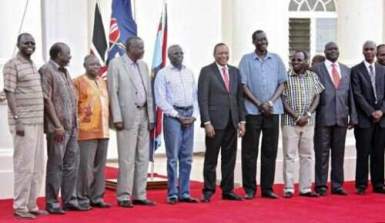South Sudan president says seven released detainees could still face trial
February 7, 2014 (JUBA) – South Sudanese President Salva Kiir said that seven senior political figures released on bail earlier this month could still be tried under the country’s transitional constitution, should an investigatory committee find they have a case to answer for their role in last year’s alleged coup attempt.

The first – ‘Group A’ – comprise the four political figures still in detention, as well as Machar, Taban Deng Gai and Alfred Lado Gore.
This group is considered to have played a major role in the alleged plot to overthrow the government and will not be eligible for a pardon.
The second – ‘Group B’ – on the other hand are considered to have played some role in the plot, but there is currently insufficient evidence to prosecute them.
The president made the remarks at a briefing on Thursday which brought together members of the leadership council of the governing Sudan People’s Liberation Movement (SPLM), along with cabinet ministers, the national legislative assembly and key presidential advisors and business associates.
It marks the first official meeting since the outbreak of violence in mid-December, which swept the country.
Held at the presidential palace, Kiir said his government had not yet received the agenda of expected negotiations with rebels under the command of former vice-president, Riek Machar, although he acknowledged his administration had received notification of the resumption of talks in the Ethiopian capital, Addis Ababa, next Monday.
“We have not until now received the agenda of the negotiation even though we have been notified. If we know the agenda of the negotiation, we would have brought it here so that we all discuss it as the party”, Kiir told party members.
He admitted coming under intense international pressure to release political prisoners, but that his administration had stood its ground until last week when the justice ministry recommended the release of seven of the 11 detainees. The group was subsequently granted bail to neighbouring Kenya on safety grounds.
“You know that since the arrest was made after the 15 December failed coup attempt, there have [been] intense pressure on me. Delegations after delegations have been coming to Juba and have met with me and held subsequent meetings in which all those who met me asked for the release of the detainees”, he said.
Kiir, who made his address in a mix of Arabic and English, stressed that should new evidence emerge the former detaineees would be required to return to South Sudan to answer the charges.
“He will have to bring them back”, he told the assembled audience, referring to Kenyan president Uhuru Kenyatta who requested bail for the detainees.
“These people will be tried if the court finds later that they played a role in the failed coup attempt”, Kiir told the audience at the meeting.
ACCUSATIONS DENIED
Meanwhile, his spokesperson, Ateny Wek Ateny, denied accusations made by Machar, that the Kiir administration had committed ethnic cleansing.
“It has been said time and again that the president, Salva Kiir, is a nationalist and he is committed to ensuring that South Sudan, which is multi-ethnic, multi-religious and multi-races, will not accept direct or indirect engagement of anybody with a political project aimed at ethnic cleansing”, Ateny told journalists at a separate news briefing.
He described the accusations as “utterances from a desperate rebel leader”.
“These accusations are nothing but mere attempts by Dr Riek Machar and his forces, which is exclusively one tribe, to cover their side from the atrocities and the genocide they have committed against innocent civilians who know nothing about politics”, he said.
Machar’s Nuer tribe and the Dinka, to which Kiir hails, are South Sudan’s largest tribes, representing an estimated 60 per cent of the total population, according to a 2008 census.
Rivalry for the country’s leadership between the two political foes has led to increased tensions in recent months, boiling over on 15 December after clashes between Dinka and Nuer factions within the presidential guards.
Violence spread throughout the country, leading to fears of an all-out civil war, with loyalties dividing along tribal lines.
KIIR WON’T STAND DOWN
Ateny also out rightly rejected calls for Kiir to step down before the 2015 elections, stressing that South Sudanese will have the ultimate say at the ballot box.
“These calls for the stepping down of the democratically elected leader are the illusive political ploy of none other than the rebel leader Dr Riek Machar himself and his supporters”, he said.
“President Kiir was elected, and only through ballot can he be made to step aside should the people of South Sudan choose another leader in a free and fair election”, he added.
Ateny further maintained that Kiir would not be swayed from seeking a second term in office by “gun threats and outrageous political desperation” from the rebel leader, who was removed from his position in July after the president sacked his entire cabinet.
(ST)
